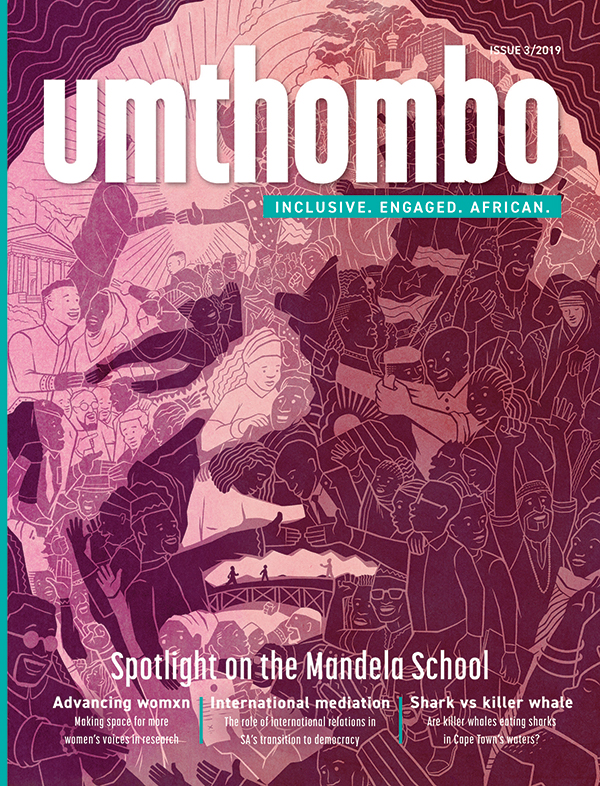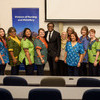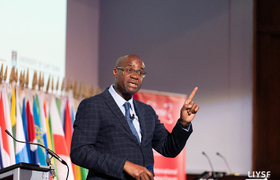Large-scale research funding for UCT
22 January 2019 | Story Staff writer. Photo quimono, pixabay. Read time 9 min.
Researchers from UCT are included in two of 12 international teams selected by United Kingdom Research and Innovation (UKRI) to establish large interdisciplinary research hubs based at leading UK universities that address the world’s complex development challenges.
The research hubs are funded through the Global Challenges Research Fund (GCRF), which was set up by the UK government to support research that tackles the challenges faced by developing countries. It offers five years of large-scale funding for initiatives that aim to make the world safer, healthier and more prosperous.
The two hubs UCT is involved in – the UKRI GCRF Accelerating Achievement for Africa’s Adolescents Hub and the UKRI GCRF One Ocean Hub – were chosen to be among the 12 successful applicants out of a pool of some 380.
UKRI GCRF Accelerating Achievement for Africa’s Adolescents Hub
Led by an interdisciplinary team at Oxford University and UCT, the UKRI GCRF Accelerating Achievement for Africa’s Adolescents Hub will aim to discover which combinations of services can most efficiently and cost-effectively help adolescents achieve their potential across multiple life domains: health, education, employment and safety. To achieve this, they will work with university partners across Africa from South Sudan and the Democratic Republic of Congo to Lesotho and Tanzania, and alongside international partners, governments across the continent, donors, non-governmental organisations and young people themselves.
“Africa’s adolescents deserve the best evidence and the best opportunities.”
By testing different combinations of interventions – such as parenting programmes, government-disbursed cash transfers, business skills and violence prevention – this hub will identify ‘accelerator synergy’ service combinations to boost nutrition, health, schooling, employment, gender equality and safety for teenagers across Africa. The goal is to provide policy-makers with the evidence they need to choose programmes that work and are cost-effective and scalable.
The hub also involves active capacity-building of 35 early-career academics in Africa and 10 in the UK, including eight co-funded doctoral students and five postgraduate positions per year.
Professor Lucie Cluver, a principal investigator at Oxford University and honorary professor at UCT’s Department of Psychiatry and Mental Health, is one of the three directors of the hub.
“We have been lucky to work for many years with governments across Africa, United Nations agencies and donors,” says Cluver. “They want to help their adolescents to achieve the Sustainable Development Goals, but this is a major challenge with fiscal resources and shrinking global aid.
“This hub aims to meet their needs: to identify what simple combinations of services are cost-effective to improve health, education, employment and safety. Africa’s adolescents deserve the best evidence and the best opportunities.”
UCT academics Professor Cathy Ward from the Department of Psychology and Dr Elona Toska from the Centre for Social Science Research and the Department of Sociology are also part of the research hub.
“By bringing together people from different disciplines, we’re essentially ‘cross-pollinating’ our ideas and approaches to analysis,” Toska says. “And by involving the young people that stand to benefit from the hub’s findings, we are giving them the chance to get involved in a more structured and valuable way.
“The hub will be implemented as a close partnership between Oxford and UCT, building on longstanding existing research collaborations. The UCT team will help coordinate several of the hub’s work-packages, support with translating the generated evidence into practice, and co-lead adolescent involvement in the hub’s work.”
UKRI GCRF One Ocean Hub
The UKRI GCRF One Ocean Hub, led by the University of Strathclyde, aims to transform our response to the multiple, urgent challenges that threaten the health of the world’s ocean and its contributions to human well-being.
Whereas current solutions are disconnected across sectors and levels, and from those people most affected by ocean degradation, the UKRI GCRF One Ocean Hub aims to unify them.
“[The hub] seeks to generate new knowledge, facilitate the sharing of scientific data, best practices and approaches to enhance use, development, governance and benefit-sharing of our oceans.”
By bringing together a collaboration of more than 50 partners – including research centres, development organisations, community representatives, national and regional governments and multiple United Nations agencies – the UKRI GCRF One Ocean Hub seeks to bridge disconnections in law, science and policy and to integrate governance frameworks to balance multiple ocean uses with conservation.
The hub strives to empower the communities, women and children most reliant upon the oceans to inform decisions based on multiple values and knowledge systems. It will investigate how to share fairly and equitably the environmental, socio-cultural and economic benefits of ocean conservation and sustainable use.
Five UCT researchers from three departments will be co-investigators on the hub: Dr Lynne Shannon from the Department of Biological Science, Dr Tobias Schonwetter from the Department of Commercial Law, and Dr Philile Mbatha, Associate Professor Merle Sowman and Associate Professor Rachel Wynberg from the Department of Environmental & Geographical Science.
“The hub is a direct response to the call to create ‘knowledge hubs’ made at the 2017 United Nations Ocean Conference on Sustainable Development Goal 14: life below water,” says Sowman, head of the UCT environmental & geographical sciences department. “It seeks to generate new knowledge, facilitate the sharing of scientific data, best practices and approaches to enhance use, development, governance and benefit-sharing of our oceans.”
The hub will specifically address the challenges and opportunities of South Africa, Namibia, Ghana, Fiji and Solomon Islands to enhance the resilience of marine ecosystems and vulnerable groups dependent on coastal and resources. The hub’s knowledge will be shared at regional (South Pacific, Africa and Caribbean) and international levels.
 This story was published in the third issue of Umthombo, a magazine featuring research stories from across the University of Cape Town.
This story was published in the third issue of Umthombo, a magazine featuring research stories from across the University of Cape Town. Umthombo is the isiXhosa word for a natural spring of water or fountain. The most notable features of a fountain are its natural occurrence and limitlessness. Umthombo as a name positions the University of Cape Town, and this publication in particular, as a non-depletable well of knowledge.
Read the complete third issue online or subscribe and receive new issues in your inbox every few months.
 This work is licensed under a Creative Commons Attribution-NoDerivatives 4.0 International License.
This work is licensed under a Creative Commons Attribution-NoDerivatives 4.0 International License.
Please view the republishing articles page for more information.










